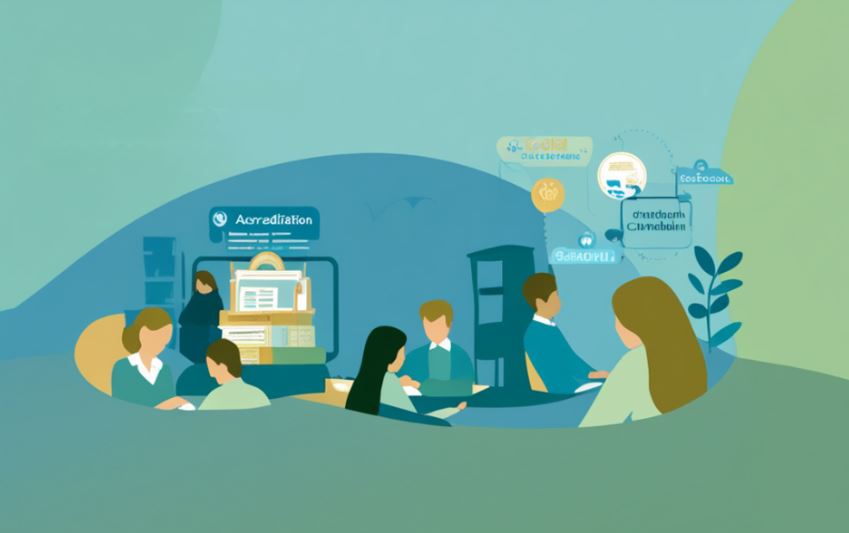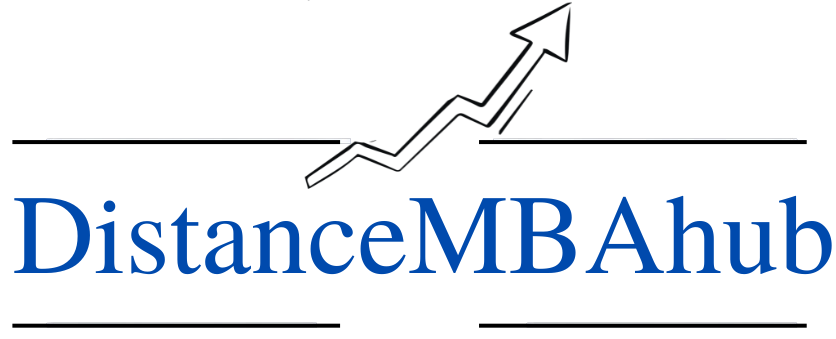
What to Look for in a Distance MBA Program: A Guide to Accreditation, Curriculum, and Faculty
The allure of an MBA remains as strong as ever, promising enhanced career prospects, leadership skills, and a significant boost in earning potential. However, the traditional on-campus model isn’t always feasible for working professionals, those with family commitments, or individuals residing in remote areas.
This is where the Distance MBA steps in, offering the same prestigious qualification with the flexibility of online learning.
But with a plethora of institutions offering distance programs, how do you sift through the options and identify a program that truly delivers value and aligns with your aspirations? Choosing the right Distance MBA is a critical decision that can shape your future. This comprehensive guide will walk you through the essential pillars of evaluation: Accreditation, Curriculum, and Faculty, empowering you to make an informed choice.
Pillar 1: Accreditation – The Gold Standard of Credibility
Accreditation is arguably the most crucial factor to consider when evaluating any MBA program, especially a distance one. It’s a seal of approval from an independent body, signifying that the institution and its programs meet rigorous quality standards. Think of it as a guarantee that your degree will be recognized, respected, and valued by employers worldwide.
Why is Accreditation So Important?
- Employer Recognition: A degree from an unaccredited institution might not be recognized by potential employers, diminishing the value of your hard-earned qualification. Accredited degrees carry weight and open doors.
- Credit Transferability: If you ever decide to pursue further education, credits from an accredited program are far more likely to be accepted by other institutions.
- Financial Aid Eligibility: Many financial aid programs, scholarships, and employer tuition reimbursement schemes require you to be enrolled in an accredited program.
- Quality Assurance: The accreditation process involves a thorough review of the institution’s faculty, curriculum, student services, and resources, ensuring a high standard of education.
Types of Accreditation to Look For:
In India, the primary regulatory bodies for higher education are the University Grants Commission (UGC) and the All India Council for Technical Education (AICTE). For management programs, specifically, these are the key accreditations:
- University Grants Commission (UGC): This is the paramount body in India responsible for the coordination, determination, and maintenance of standards of university education. Ensure the university offering the Distance MBA is recognized by the UGC. Programs offered under Open and Distance Learning (ODL) mode also require specific UGC-DEB (Distance Education Bureau) approval. Always check the latest list of recognized institutions and programs on the UGC-DEB website.
- All India Council for Technical Education (AICTE): AICTE is responsible for the planning, formulation, and maintenance of norms and standards, quality assurance through accreditation, and funding in technical education, including management. While not all universities require AICTE approval for conventional MBA programs, for standalone management institutions or specific programs, AICTE approval is critical. For Distance MBAs, ensure the program is approved by AICTE if it’s a technical/management program offered by an institution under their purview.
- NAAC (National Assessment and Accreditation Council): An autonomous body established by the UGC, NAAC assesses and accredits higher education institutions in India. While NAAC accreditation is for the institution as a whole, a high NAAC grade indicates a strong overall educational environment, which is a good supplementary indicator of quality for its distance programs as well.
- International Accreditations (A Bonus, Not a Must for All): For those aspiring to work internationally or seeking a globally recognized credential, look for programs with international accreditations such as:
- AACSB (Association to Advance Collegiate Schools of Business): This is the gold standard for business schools worldwide. Only a small percentage of business schools globally achieve AACSB accreditation.
- AMBA (Association of MBAs): A UK-based organization that accredits MBA programs globally.
- EQUIS (EFMD Quality Improvement System): Another European accreditation for business schools.
How to Verify Accreditation:
- Check the University Website: Reputable institutions proudly display their accreditations.
- Visit Regulatory Body Websites: Always cross-reference information on the official websites of UGC-DEB and AICTE. Look for the specific program and university approval.
- Ask for Proof: Don’t hesitate to directly ask the admissions department for documentation regarding their accreditation status.
Beware of: Institutions claiming affiliations without proper accreditation, or those using vague terms like “industry recognition” instead of official regulatory approvals.
Pillar 2: Curriculum – The Heart of Your Learning Journey
Once you’ve confirmed accreditation, the next step is to deep dive into the program’s curriculum. This is what you’ll actually be studying, and it needs to be relevant, comprehensive, and tailored to your career goals. A strong curriculum should not only impart theoretical knowledge but also develop practical skills crucial for leadership and management roles.
Key Aspects to Evaluate in the Curriculum:
- Core Subjects and Foundation:
- A robust MBA curriculum typically covers fundamental business disciplines such as:
- Financial Management: Accounting, Corporate Finance, Investment Management
- Marketing Management: Consumer Behavior, Digital Marketing, Brand Management
- Operations Management: Supply Chain Management, Project Management, Quality Control
- Human Resource Management: Organizational Behavior, Talent Acquisition, Performance Management
- Economics: Managerial Economics, Macroeconomics
- Strategic Management: Business Strategy, Entrepreneurship
- Business Analytics/Decision Science: Data Analysis, Quantitative Methods
- Ensure these core subjects are comprehensively covered, providing a strong foundation in all areas of business.
- A robust MBA curriculum typically covers fundamental business disciplines such as:
- Specializations and Electives:
- A good Distance MBA program will offer a range of specializations (e.g., Finance, Marketing, HR, Operations, Business Analytics, Information Technology, International Business, Healthcare Management).
- Consider if the available specializations align with your career aspirations. Do they offer depth in the areas you want to master?
- Look at the elective courses within these specializations. Are they contemporary and relevant to current industry trends? For example, a marketing specialization should ideally include courses on digital marketing, social media analytics, and e-commerce.
- Modern and Industry-Relevant Content:
- The business world evolves rapidly. Is the curriculum updated regularly to reflect current industry practices, technologies, and global economic trends?
- Does it incorporate emerging concepts like Artificial Intelligence in business, sustainability, design thinking, or ethical leadership?
- Look for practical application components such as case studies, simulations, and real-world projects. These are crucial for developing problem-solving and decision-making skills.
- Learning Methodology and Resources:
- Online Learning Platform: Is the learning management system (LMS) user-friendly, stable, and equipped with features like discussion forums, virtual classrooms, access to e-books, and assignment submission tools?
- Interactive Content: Does the program offer a blend of learning materials such as video lectures, interactive modules, online quizzes, and live webinars?
- Student Support: What kind of academic and technical support is available to distance learners? Are there dedicated mentors or academic advisors?
- Project Work and Dissertation: Many MBA programs culminate in a significant project or dissertation. Evaluate the support provided for these, including research guidance and faculty supervision.
- Program Structure and Flexibility:
- Duration: What is the typical completion time? Is there flexibility to extend or accelerate your studies?
- Pace: Is the program self-paced, or does it follow a structured schedule with deadlines? A balance often works best for working professionals.
- Examination Pattern: How are assessments conducted? Are they online, proctored, or a combination?
How to Evaluate the Curriculum:
- Download the Prospectus/Syllabus: This is your primary source of information. Read it thoroughly.
- Compare with Peers: Look at the curricula of other reputable distance MBA programs to gauge comprehensiveness and relevance.
- Talk to Alumni: Current students or recent graduates can offer invaluable insights into the curriculum’s strengths and weaknesses.
- Align with Career Goals: Constantly ask yourself: “Does this curriculum equip me with the knowledge and skills I need for my desired career path?”
Pillar 3: Faculty – The Architects of Your Learning
The quality of the faculty directly impacts the quality of your education. These are the individuals who will be guiding your learning, sharing their expertise, and shaping your understanding of the business world. In a distance learning environment, their ability to engage and deliver effectively online is particularly vital.
What to Look for in the Faculty:
- Academic Credentials and Experience:
- Qualifications: Do they hold advanced degrees (Ph.D., DBA) from reputable institutions?
- Research and Publications: Are they actively involved in research and publishing in their field? This indicates a depth of knowledge and a commitment to staying current.
- Industry Experience: Look for faculty members who bring real-world industry experience to the classroom. Their practical insights can bridge the gap between theory and application, which is immensely valuable.
- Teaching Experience and Methodology:
- Online Teaching Expertise: Have they been specifically trained or have experience in delivering courses in an online format? Online teaching requires different pedagogical skills than traditional classroom instruction.
- Engagement and Interaction: How do they facilitate engagement in a virtual environment? Do they use discussion forums, live Q&A sessions, guest speakers, or interactive tools effectively?
- Mentorship and Accessibility: How accessible are they to students for queries, discussions, and mentorship? In a distance program, clear communication channels are critical.
- Diversity of Expertise:
- Does the faculty represent a diverse range of specializations and backgrounds? A variety of perspectives enriches the learning experience and broadens your understanding of different business functions and industries.
- Are there guest lecturers or industry experts who contribute to the program? Their insights can offer fresh perspectives and networking opportunities.
- Student-Faculty Ratio (Consider for Support):
- While harder to quantify in an online environment, consider if there’s a reasonable student-to-faculty ratio, especially for dedicated academic support or project supervision. A very high ratio might indicate limited personalized attention.
How to Evaluate the Faculty:
- Review Faculty Profiles: Most university websites have detailed profiles of their faculty members, including their qualifications, research interests, publications, and industry experience.
- Search for LinkedIn Profiles: Look up faculty members on LinkedIn to get a sense of their professional network and current roles.
- Look for Faculty-Authored Content: Are there faculty blogs, articles, or webinars you can access to get a feel for their teaching style and areas of expertise?
- Attend Information Sessions/Webinars: These often feature faculty members, giving you a chance to hear them speak and interact.
- Ask Alumni: Current and former students are often the best source of information regarding faculty effectiveness and accessibility.
Beyond the Pillars: Other Important Considerations
While accreditation, curriculum, and faculty form the core of your evaluation, don’t overlook these additional factors:
- Cost and ROI: Compare tuition fees, hidden costs, and evaluate the potential return on investment (ROI) in terms of career advancement and salary increase.
- Alumni Network: A strong and active alumni network can provide invaluable networking opportunities, mentorship, and career support.
- Career Services: Does the institution offer dedicated career services for distance learners, including resume building, interview preparation, and job placement assistance?
- Technology Requirements: Ensure you have the necessary internet access and hardware to participate effectively in the online program.
- Student Support Services: Beyond academic support, what other services are available? Counseling, technical support, library access, etc.
- Reputation of the Institution: The overall brand reputation of the university plays a role. A well-established university with a strong track record in traditional education often translates to quality in distance learning as well.
Conclusion: Your Future, Your Choice
Embarking on a Distance MBA journey is a significant investment of your time, effort, and money. By meticulously evaluating programs based on Accreditation, Curriculum, and Faculty, you lay a strong foundation for a rewarding and impactful educational experience. Don’t rush the decision. Do your due diligence, ask probing questions, and choose a program that not only fits your current lifestyle but also propels you towards your ambitious career goals. Your future leadership journey starts with making the right choice today.

